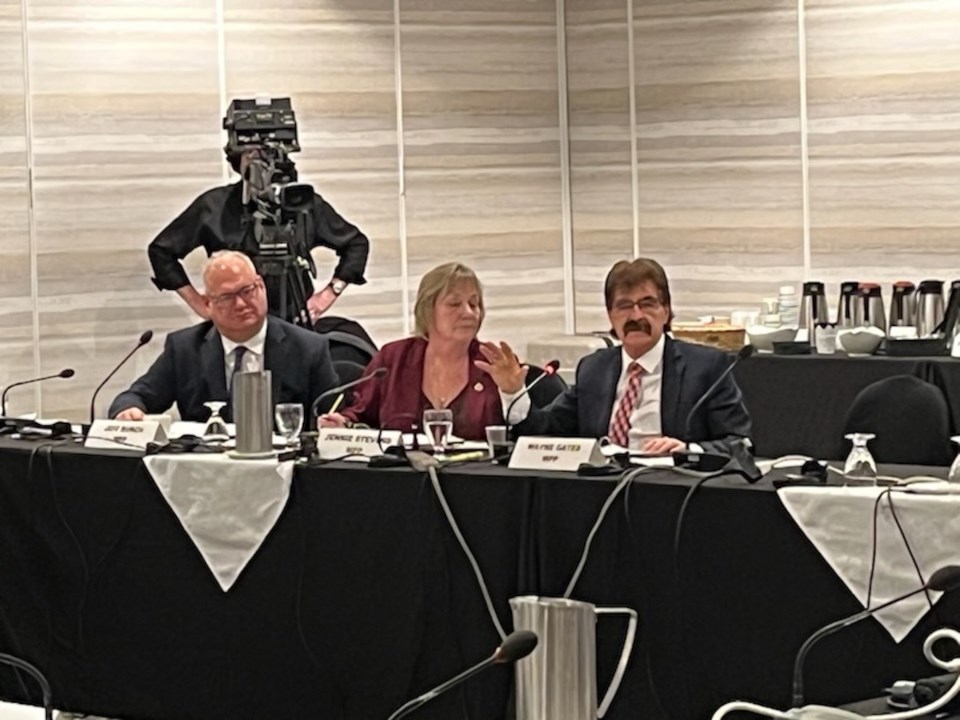Does Niagara Region need incremental change or something more substantial if it wants to build more homes?
The province's heritage, infrastructure and cultural policy committee addressed that question as it kicked off its tour of the province Wednesday for a study on whether upper-tier governance reforms could help build more homes.
Local leaders held differing views: Niagara's regional chair wants the province to do more to help build homes while avoiding "governance experiments" that could go awry, while a local mayor floated the idea of larger reforms on behalf of a group of West Niagara towns.
Former housing minister Steve Clark initially wanted to appoint "regional facilitators" to probe whether regions including Durham, Halton, Niagara, Simcoe, Waterloo and York were still working well or if they'd become too bloated and stand in the way of efficient governance and building homes.
After Clark resigned in the wake of the Greenbelt scandal, Paul Calandra took over and asked the legislative committee to take over and focus less on general governance reform and more on how to expedite home building in those regions.
Wednesday's meeting in St. Catharines was the first of several happening over the next two weeks.
Niagara Regional Chair Jim Bradley centred his comments around building homes.
"This governance discussion should be focused on how a manipulation of governance would result in more homes being built," Bradley's speaking notes said, which were provided to The Trillium.
He wants the province to strike a "new deal" to close the infrastructure funding gap, using language drawn from a recent agreement between the Tories and the City of Toronto to help alleviate the capital city's budget woes.
"For instance, we continue to seek funding partners for a new wastewater treatment plant that, once opened, will allow thousands of new homes to be built," Bradley's notes said.
The province should also create a "chief planner" to help "resolve conflicts among all parties to expedite (housing) approvals" because regions and municipalities aren't the only source of delay.
The Ontario Land Tribunal appeals process needs to be "streamlined," Bradley's notes said, "so the appellant is required to demonstrate that an appeal has merit before proceeding."
His last two recommendations revolve around encouraging the private sector to build faster.
First, he'd like more provincial programs to encourage the development of affordable and purpose-built rentals. Late last year, Calandra announced the province would waive the provincial portion of the HST on purpose-built rentals.
Bradley also wants the province to give municipalities tools "to help ensure that development happens in a timely fashion." As an example, he referred to the recently announced "use it or lose it" policy that Calandra imposed on some ministers' zoning orders (MZO).
MZOs are a tool the provincial government uses to override local planning decisions and bylaws, often to fast-track developments. They were rarely used before the Tories came into power in 2018. Since then, over 100 have been issued, and they've been the source of significant controversy.
In December, Calandra said his government was ready to revoke eight MZOs if the developers didn't get cracking on the remaining approvals and get shovels in the ground. He put 14 others under "enhanced monitoring."
Broader reforms, like amalgamation or dissolution, should be off the table, according to Bradley's notes.
"The facts speak for themselves: amalgamation or dissolution is not a silver bullet solution to build more homes, tackle homelessness or even reduce administrative burdens," his notes said. "I would respectfully suggest that a series of incremental changes could strengthen our region, all while avoiding governance experiments that would be costly and distract from our ultimate goal."
Lincoln Mayor Sandra Easton, however, floated the possibility of larger reforms, according to her speaking notes, which were also provided to The Trillium.
Easton also noted she wanted to do a joint deputation with the mayors of West Lincoln and Grimsby to speak with "one unified message," but the committee didn't allow it.
Easton proposed "the coming together" of cities in the western part of the region.
"We believe there could be a successful establishment of a new governance model for Niagara and even a new entity in West Niagara," her speaking notes said.
"In what form that is, we have not come to a conclusion, but we believe there are logical connections between us in the West. Top of mind is and always has been, better service delivery and timely decisions to ensure government is working efficiently on behalf of our taxpayers."
Some of the towns in West Niagara have worked toward this vision already, Easton's notes said, and built a new high school, delivered fire services and a shared fairground.
"Further conversations around shared economic development and tourism are also underway."
Despite these efforts, more work needs to be done, Easton's notes said.
"The current Niagara and regional governance structure presents some challenges in efficiently delivering services and addressing the growing need for housing in our communities," her notes said.
"We believe that by forming a more integrated service delivery model, we can further streamline the decision-making processes, optimize resource allocation, and better serve the diverse needs of our residents. This can take on multiple forms, ranging from administrative only, to more integration in terms of how councils are structured."



